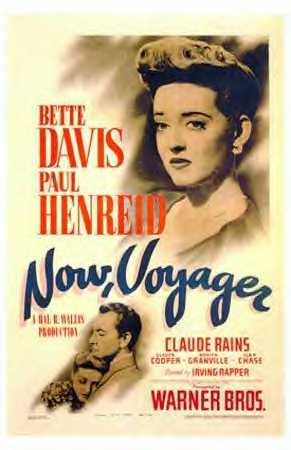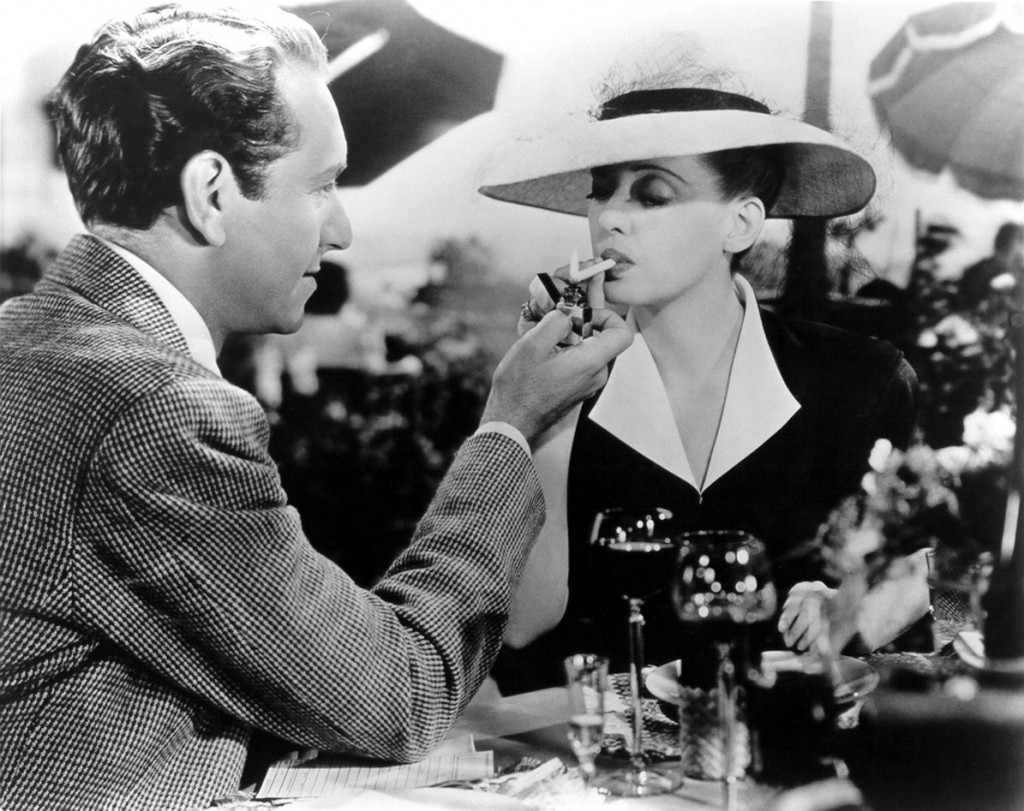 Now, Voyager
Now, Voyager
Directed by Irving Rapper
Produced by Hal B. Wallis
Screenplay by Casey Robinson
Starring: Bette Davis
Based on Now, Voyager
Warner Bros.
October 31, 1942
Sometimes it is clear that I was raised by my grandparents. My taste in movies is pretty indicative of this. From my grandfather I have gained a deep love of westerns, anything John Wayne or Clint Eastwood will do. But it is what my grandmother gave me that has changed my life: a deep, enduring love of Bette Davis.
I spent a large portion of my childhood afraid of everything. I was, and am, a scaredy cat when it comes to horror movies, entering dark rooms, going into my basement to do laundry, and being around balloons. (They might pop. That’s terrifying.) Additionally, even though I was often described as a social butterfly by my elementary school teachers, I lacked confidence and social grace.

Bette Davis was surely my exact opposite. She’s credited with so many great quotes that were “before her time.” One of the most well-known of which is, “When a man gives his opinion, he’s a man. When a woman gives her opinion, she’s a bitch.” [x] Other snippets of her wisdom guide me still. She refused to ever have her name under the movie title, she fought aggressively for fair treatment on set, and she was an incredibly hard worker.
The first film of Davis’s I ever watched was Now, Voyager, so even though it is not my favorite Bette Davis film, it is responsible for the beginning of my longest love. I was too young to understand some of what was happening on screen, but I felt very connected to Davis’s portrayal of Charlotte Vale.
Charlotte is having a mental breakdown. Her mother is emotionally manipulating and torturing her into a mentally imbalanced state. The film begins with a visit from a doctor (Claude Rains) who thinks he can help her, even though Charlotte’s mother, the detestable Mrs. Vale (Gladys Cooper) insists that Charlotte is fine. The horrid mother explains that Charlotte was her menopause baby, has always been an ugly duckling, and that she has been very sheltered her whole life. “The very word ‘psychiatry,’ Dr. Jaquith, doesn’t it fill you with shame, my daughter, a member of our family?” As a child I deeply understood Charlotte’s plight.
Luckily Dr. Jaquith isn’t buying Mrs. Vale’s bologna and uncovers that Charlotte is intelligent, talented, and intensely secretive. She hides an entire life of passions and abilities from her controlling mother.

The middle of the movie holds up to my memory of the film and my expectations a little less than I had hoped. Charlotte goes with Dr. Jaquith to his clinic, where she is shortly cured of her ailment. However, she struggles to believe that she is better and must be coaxed into letting herself be beautiful. Unfortunately, this idea of beauty comes less from within and more from the loss of weight, waxing of eyebrows, and removal of eyeglasses. (Yes, the trope of the beautiful nerd under the glasses is as old as film.)
However, the mental therapy is taken seriously in the film, and the doctor urges her to remember the coping techniques they’ve been practicing. He also delays her return to her mother with a sea cruise. As she leaves he gives her Walt Whitman’s poem “The Untold Want,” from which the film gets its name:
“The untold want, by life and land ne’er granted,
Now, Voyager, sail thou forth, to seek and find.”
It is here, far into the movie, that the male lead is introduced. Jerry Durrance (Paul Henreid) is a charming European who begins a long wooing of our leading lady. However, he is married, and the father of two, so he keeps their interactions flirtatious but chaste. She keeps her identity a secret for most of their time aboard the ship, while she experiences memories, for us flashbacks, of her mother tearing her down and the doctor attempting to build her up. She feels a kinship with Jerry’s youngest daughter through the stories he tells about the awkward little girl. Jerry’s wife despises their youngest daughter and treats her cruelly. Oh the cycles in this movie.

As Charlotte grows more into her own sense of confidence, Jerry falls more in love with her. They share a few kisses, and many cigarettes, but ultimately know they cannot be together. Jerry returns to his family, and Charlotte to her mother. It is this scene that I remember clearest of all.
Mrs. Vale quickly tears Charlotte apart, demands that she wear her old clothing, take off her make-up, and don her glasses. Days of struggle in which Charlotte is again and again manipulated by her mother. “Mother, I don’t want to be disagreeable or unkind. I’ve come home to live with you again here in the same house. But it can’t be in the same way. I’ve been living my own life, making my own decisions for a long while now. It’s impossible to go back to being treated like a child again.” How easy it is to identify with that as an adult who visits her parents.
Her mother has not changed in all of Charlotte’s time away and even fakes a fall down the stairs to garner her daughter’s sympathy and wield more control over her. Through all of this Charlotte manages time and again to find her own voice. Sometimes it is through writing to Dr. Jaquith, but once in a while it is in standing up to her mother.

I will note, that at this point the film is a little more than half over. When I rewatched Now, Voyager to write this essay I was astonished by its length and complication plot. How did ten year old me follow this? Plus, I remember watching it several weekends in a row. What a young dedicated fan I was!
The rest of the film is filled with romance, some intrigue, unrequited love, and sudden death! This is the movie that first told me that even if nothing works out quite the way that it should, sometimes it still works out for the best. Now, Voyager is a romance, a “weepie” some call it, it is melodramatic, over the top, and yet so true to life. Bette Davis has always given me the inspiration to be myself. It may not be perfect, but “don’t let’s ask for the moon. We have the stars.”

